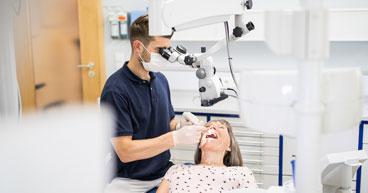
The last two decades of cancer research have produced a slew of new drugs that have made a significant difference in the lives of millions of cancer patients. Immunotherapy and targeted therapy drugs specifically have helped many patients live longer and with a high quality of life.
But cancer drugs—just like over-the-counter medications or those for other diseases—don’t always work the same way in every patient. A medication may work wonders for one patient but produce no results in another. Even immunotherapy drugs called immune checkpoint inhibitors are effective in fewer than 40 percent of patients.
“One person takes Benadryl® (diphenhydramine) and they're completely wiped out and another person takes Benadryl and they don't feel anything at all,” says Alan Bryce, MD, a Medical Oncologist and Chief Clinical Officer at City of Hope® Cancer Center Phoenix.
The answer to what accounts for these disparities may lie in the field of pharmacogenomics. This growing area of precision medicine considers how a person’s unique genetic makeup influences his or her response to pharmaceutical drugs and medications.
“Just as our genes determine our blood type and eye color, they are partially responsible for how our bodies respond to medications,” says Maurie Markman, MD, President of Medicine & Science for City of Hope Cancer Centers Atlanta, Chicago and Phoenix. “Pharmacogenomics looks for changes in these genes that may determine whether a medication could be a viable treatment or cause specific side effects.”
In this article, we’ll explore the field of pharmacogenomics. Topics include:
If you’ve been diagnosed with cancer and are interested in getting a second opinion about your diagnosis or treatment plan, call us or chat online with a member of our team.
How are drugs metabolized?
Most drugs are metabolized in the liver. Enzymes in the liver break down the drugs so they can perform their prescribed duties. Once a drug has been metabolized, the liver delivers the waste products into the digestive system so they can be eliminated from the body.
Drugs interact with cells in a variety of ways, as detailed below, and our cells may determine how effective those interactions are.
Uptake: Drugs may need to be absorbed into cells in order for them to hit their targets. If a drug uptake is too slow, it can build up elsewhere in the body and become toxic. If the uptake is too fast, the drug may enter and leave a cell before it’s had time to work.
Breakdown: Once inside the body, a drug needs to be broken down so its components can do their jobs. If a drug breaks down too quickly or slowly, it may affect the dosage required to be effective.
Receptors: Many cells, including cancer cells, have receptors—molecular antennae that they use to exchange electronic and chemical signals with other cells. Cancer cells may use these receptors to promote growth or evade the immune system. Some cancer drugs are designed to seek out these receptors on cancer cells and block their signals.
Most targeted therapy and immunotherapy drugs for cancer patients are designed to seek out receptors on cancer cells. Using advanced genomic testing and other diagnostic tests, doctors may be able to determine mutations on cancer cells and target them with drugs designed to attack those mutations.
Genetic factors and drug treatments
The field of pharmacogenomics works by using patients’ genetic profiles to learn how they may process a variety of drugs, including cancer treatments. Differences between individuals may affect drug absorption, metabolism or activity. “The one-size-fits-all approach to cancer treatment is quickly becoming a thing of the past,” says Dr. Markman. “It is being replaced with medications and treatments targeted directly to a patient’s individual DNA.”
In some cases, doctors base the majority of their drug prescriptions on clinical factors, such as the cancer’s stage and the patient’s age and gender. But someone’s genetic factors may be as important as the clinical factors. For a small subset of drugs, researchers have identified genetic variations that influence how well people respond. In these cases, doctors may use pharmacogenomics information to select the right medication with the best likelihood of working and identify people who need an unusually high or low dose.
“People metabolize drugs differently,” Dr. Bryce says. “In the old days, the only way we may know was by trial and error. But now with some drugs we can test the blood and say ‘you're a fast metabolizer or you’re a slow metabolizer and here's what it means for how this drug will affect you.’ ”
The U.S. Food and Drug Administration, which monitors the safety of all drugs in the United States, has included pharmacogenomics information on the labels of more than 150 medications. This information—which may cover dosage guidance, possible side effects or differences in effectiveness for people with certain genomic variations—may help doctors tailor their drug prescriptions for individual patients.
The limitations of pharmacogenomics
But there are limitations. Pharmacogenomics does not provide information about how patients may respond to every medication. Some may need more than one test if they are taking more than one type of medication. “The tests are not a crystal ball—they cannot determine the perfect drug for your condition or provide information on drug interactions,” says Dr. Markman. “Rather, pharmacogenomics testing can narrow down your options and help doctors prescribe the right medicine faster.”
While the use of pharmacogenomics is limited, new approaches are being studied in clinical trials. For instance, researchers at the National Cancer Institute are developing artificial intelligence (AI) technology that may be used to help doctors predict how patients respond to cancer drugs. The AI model, called Personalized Single-Cell Expression-based Planning for Treatments In Oncology (PERCEPTION), is designed to analyze a patient’s RNA, a nucleic acid in all living cells is structurally similar to DNA, and more specifically the different types of cells and their clones inside tumors. In trials with patients with multiple myeloma and breast cancer, the tool showed how just one clone cell clones was able to prevent the patient from responding to drug treatment.
The ultimate goal is to develop tests that will lead to the development of tailored drugs to treat a wide range of health problems, including various cancers. “Precision medicine in cancer care is evolving at a fast pace,” says Dr. Markman. “Pharmacogenomics is also expected to become more standard as precision medicine becomes more commonplace.”
If you’ve been diagnosed with cancer and are interested in getting a second opinion about your diagnosis or treatment plan, call us or chat online with a member of our team.



